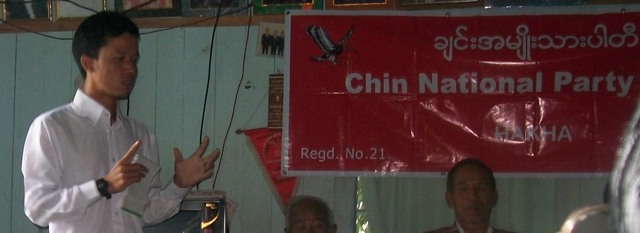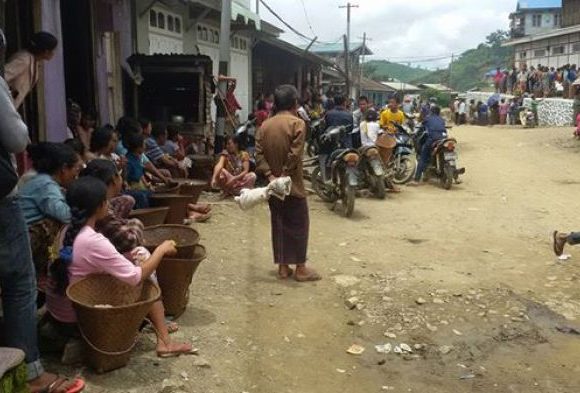Critiquing Ministries Appointments: Interview with Chin Party Leader

16 February 2011: In the wake of the appointments early this week of State Ministries in Chin State, doubts have been raised over whether the ministries are all that relevant given the uniqueness of Chin State; a State that is facing serious social and economic crises, and suffers from lack of basic infrastructures such as medical facilities, schools, as well as, chronic and ongoing serious shortages of food.
Of the nine Ministries appointed by the new Chin State Chief Minister on Monday, there is no Education or Health Ministries to serve a population that is in critical lack of basic care and education. The Chin National Party (CNP) General Secretary offers his thoughts on the new cabinet appointments.
Chinland Guardian: We have learned that the Chief Minister of Chin State has already nominated (appointed) nine ministers for the proposed ministries in Chin State. What are your views on this?
Salai Ceu Bik Thawng: Both Chin National Party (CNP) and Chin Progressive Party (CPP) have got one position each. However, CNP is never concerned with how many ministerial positions it will get, but rather with what good things we can do for our people. What is concerning is that among some of the ministers selected by the Chief Minister are those who didn’t even pass the tenth standard.
This necessarily demands the questions: Are there not enough educated and better candidates among the Chins? Should party affiliations be put above national interests? Are we only interested in working within our own circles and thereby reinforcing a system of patronage? It is disheartening that such kind of mindsets is still very much at play.
Chinland Guardian: How do you find the new list of Chin ministries, which does not seem to include other ministries such as Education and Health?
Salai Ceu Bik Thawng: They will be branched under the Ministry of Social Welfare according to Chief Minister Pu Hung Ngai. Looking at other countries, we could clearly see that Health and Education stand out separately among the most important government ministries. Therefore, a clear question can be asked on the reason why they are put under the Ministry of Social Welfare. Why is Chin State not given such separate ministries while other States such as Kachin, Karen, Mon, Rakhine and Shan have them separately?
Chin State has only two Justices appointed at the Union level, the least among the other States. Let’s take a simple look at other States just for the sake of analytical comparison. Why is Chin State with a population of about 540,000 allotted only two seats while Kayah State having a population of about 350,000 has got three seats, according to Myanmar Chronicles in 2009? In Kayah State, there are other development infrastructures including airport, railroad tracks, Computer University and University of Technology whereas none of these has been built in Chin State. A big question can be raised here: Why does Chin State remain with the least development inputs even though it is not the smallest State in terms of population? Sometimes, it makes one think if Pu Hung Ngai (Chief Minister-designate and former Chin State PDC Chairman) actually raises these issues with his superiors at the Union level. Our party’s main concern is none other than putting an end to the ongoing imbalance of rights being given to Chin State.
Chinland Guardian: However, looking at the other side of the coin, can we say some States such as Chin and Kayah have a fair portion in terms of ministry allocations when compared with other States/Regions with bigger populations such as Shan, Yangon and Sagaing?
Salai Ceu Bik Thawng: Although General Ne Win granted the Chin Statehood, an upgrade from what used to be the ‘Chin Special Division’, it was just nothing more than a symbolic transformation. If you really want to develop Chin State, then you should create a ministry which is needed, essential and helpful to the people instead of all these ministries such as Management, Industry, Energy, Electic Power, Mines and Forest. Now, the Ministry of Health and Education is not even included.
The authority just turned their back to what CNP has been campaigning for the need and establishment of ‘Ministry of Culture and Literature’, which is listed in our manifesto as one of the most important issues in Chin society. The Ministry of Culture and Literature is created for other States and Regions including Kayah, Kachin, Taningtari, and Mon even though we have never heard of them making a proposal as such. Like other States, Chin State should be given a complete separate ministry for construction, which is vitally needed. The Ministry of Management is formed only in Chin State and Pegu Region, and I don’t even have any ideas what kind of jobs the Ministry of Management will do. The duty of Chief Minister is management, isn’t it?
Chinland Guardian: Why do you think Ministries such as Industry, Management, Energy and Mine are created in Chin State? Is it due to a complete lack of their knowledge about Chin State and its people or is it because they think these are really needed?
Salai Ceu Bik Thawng: To be honest, I am not sure. According to the Constitution, President is supposed to consult with the Chief Minister concerned for creating necessary ministerial positions. Therefore, I am not sure about the extent to which the President took into account what the Chief Minister has suggested regarding Chin State ministry. Frankly speaking, I don’t know much about how comprehensive Pu Hung Ngai has got knowledge and made research regarding Chin State.
What we could possibly predict is that there will obviously be less job opportunities and projects created, with all these ministries which are not applicable to Chin State. Hence, there will be no need of making many budget plans and proposals to the Union Government. In their perspective, it might be a good way of saving financial resources from the government. All of these need to be reworked in the future for the Chin people to see any real benefits.
Chinland Guardian





